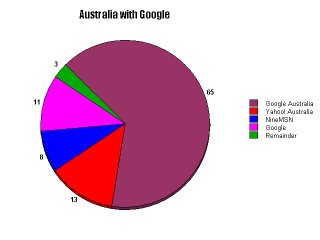Just a raw plug for my first SEO clients:I use the excerpt above as part of my signature on this experimental blog to help generate temporal links to Steve's company sites. It's an experiment to see how the rankings are affected.
Short Cut Computers belongs to Steve Trim, a friend who actually paid me to learn this stuff and put it to work for him.
And Steve Trim's other business, Barcode Solutions., which will be my second project.
Steve's main site, Shortcut Computers, had been designed to be easily modified by him and his staff using FrontPage(tm). It had been up for nearly a year when he became interested in what was happening there. -- Nothing.
The site registered about 35 visitors in a year; most of which were probably Steve himself. It was there for him to say he had a website.
After reading a few books on SEO/SEM, we redid the site.
First, it needed to be more dynamic and easier to use. Still experimenting with options, we mistakenly chose PostNuke for the CMS. PostNuke made some things easier, but overall is a programmers' CMS.
Then the overall appearance was reconfigured. The present homepage reflects this step.
It is at least dynamic, but too many of the pages are lost behind long URLs.
Small problems.
During this process, I began researching SEO/SEM.
First step: Wade through a few books.
Second step: Find the resources needed in Australia.
Third step: Apply those resources to accomplish the goals of the business.
I began "internet marketing" back when AltaVista and Lycos were the search engine paradigms. Google and Yahoo in those days didn't exist. The key to internet marketing was, and still is, LINKS!
Step two was an eye-opener. There simply weren't that many directories and search engines. Two industries, tourism and mining, were well represented. Business listings were made on government or telecom sites. The Yellow Pages in Australia had spawned three different access sites; all of whom charged for listings.
Step three was the real challenge though.
The small company's service area was a number of suburbs on the southeast side of Melbourne. Although this area comprised over 1 million residents, it sat on the bleeding edge of broadband availability. Most of his customers were condemned to dial up Internet access.
(Click the 'Melbourne' tab on the iBurst availability map. There are other similar maps - and more timely - but this one tracks very closely and illustrate the point. Then enter 'Dandenong' to see the availability in the company's service area.)
This company, like 90% of small business in Australia, didn't want to market nationally or even citywide.
Links from search engines were good for natural rankings -- "roamers" in SEM-speak -- but to increase business, we needed visitors -- "convertibles" SEM-speak -- who could take use the services. For that, we needed to target a region not commonly defined: PPC advertising.
For Melbournians, the "southeast suburbs" is easily understood. For Google-Aus and Yahoo7, it means nothing.
We established a blog for the company to demonstrate expertise in depth, and to keep up with changes in the business climate of the service area. Fortunately, the changes came fast and furious in the media. Rupert Murdoch announced on a visit that "Internet service in Australia is abysmal." Optus went public with plans to form G-9, excluding Telstra. Then the bubble-heads in Parliament passed archaic copyright law amendments.
Nothing drives Internet traffic like other media.
Avoiding any more of the details, we managed to get 70-90 visitors per day to the site within 3 months. Page ranks from Google (2), and Alexa(about 260,000) gained over 6 months or so. The site rose quickly to SERP positions 1-4 in most of the service area. The blog is cited regularly on other blogs. We even saw visits on the blog from Canberra.
While I was away in Hawaii, things were neglected. The number of visitors held pretty solid because of the natural search. PPC campaigns were abandoned though, and 'convertibles' waned.
Overall, a success. With the caveat that it can only improve with more attention
What was found and learned about SEO/SEM in Australia was to be applied to another of Steve's enterprises: Barcode Solutions. This has to be easier. Its market is national and international. (Hope springs eternal. It wasn't...) Sphere: Related Content

